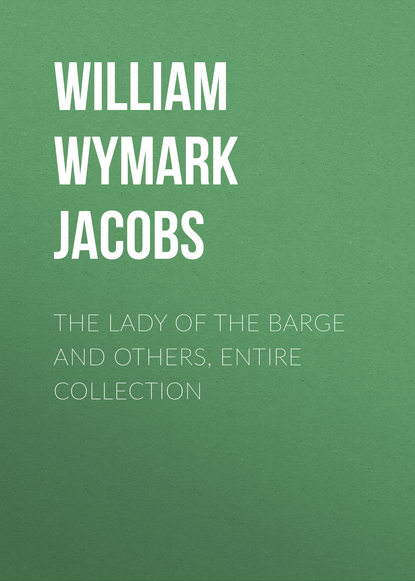По всем вопросам обращайтесь на: info@litportal.ru
(©) 2003-2024.
✖
The Lady of the Barge and Others, Entire Collection
Настройки чтения
Размер шрифта
Высота строк
Поля
“Hot work, sir,” said the sergeant, with a smile. “It’s fortunate we were handy.”
The prisoner raised a heavy head and looked up with unmistakable terror in his eyes.
“All right, sir,” he said, trembling, as the constable increased the pressure of his knee. “I ‘ain’t been in the house ten minutes altogether. By —, I’ve not.”
The sergeant regarded him curiously.
“It don’t signify,” he said, slowly; “ten minutes or ten seconds won’t make any difference.”
The man shook and began to whimper.
“It was ‘ere when I come,” he said, eagerly; “take that down, sir. I’ve only just come, and it was ‘ere when I come. I tried to get away then, but I was locked in.”
“What was?” demanded the sergeant.
“That,” he said, desperately.
The sergeant, following the direction of the terror-stricken black eyes, stooped by the table. Then, with a sharp exclamation, he dragged away the cloth. Burleigh, with a sharp cry of horror, reeled back against the wall.
“All right, sir,” said the sergeant, catching him; “all right. Turn your head away.”
He pushed him into a chair, and crossing the room, poured out a glass of whiskey and brought it to him. The glass rattled against his teeth, but he drank it greedily, and then groaned faintly. The sergeant waited patiently. There was no hurry.
“Who is it, sir?” he asked at length.
“My friend—Fletcher,” said Burleigh, with an effort. “We lived together.” He turned to the prisoner.
“You damned villain!”
“He was dead when I come in the room, gentlemen,” said the prisoner, strenuously. “He was on the floor dead, and when I see ‘im, I tried to get out. S’ ‘elp me he was. You heard me call out, sir. I shouldn’t ha’ called out if I’d killed him.”
“All right,” said the sergeant, gruffly; “you’d better hold your tongue, you know.”
“You keep quiet,” urged the constable.
The sergeant knelt down and raised the dead man’s head.
“I ‘ad nothing to do with it,” repeated the man on the floor. “I ‘ad nothing to do with it. I never thought of such a thing. I’ve only been in the place ten minutes; put that down, sir.”
The sergeant groped with his left hand, and picking up the Japanese sword, held it at him.
“I’ve never seen it before,” said the prisoner, struggling.
“It used to hang on the wall,” said Burleigh. “He must have snatched it down. It was on the wall when I left Fletcher a little while ago.”
“How long?” inquired the sergeant.
“Perhaps an hour, perhaps half an hour,” was the reply. “I went to my bedroom.”
The man on the floor twisted his head and regarded him narrowly.
“You done it!” he cried, fiercely. “You done it, and you want me to swing for it.”
“That‘ll do,” said the indignant constable.
The sergeant let his burden gently to the floor again.
“You hold your tongue, you devil!” he said, menacingly.
He crossed to the table and poured a little spirit into a glass and took it in his hand. Then he put it down again and crossed to Burleigh.
“Feeling better, sir?” he asked.
The other nodded faintly.
“You won’t want this thing any more,” said the sergeant.
He pointed to the pistol which the other still held, and taking it from him gently, put it into his pocket.
“You’ve hurt your wrist, sir,” he said, anxiously.
Burleigh raised one hand sharply, and then the other.
“This one, I think,” said the sergeant. “I saw it just now.”
He took the other’s wrists in his hand, and suddenly holding them in the grip of a vice, whipped out something from his pocket—something hard and cold, which snapped suddenly on Burleigh’s wrists, and held them fast.
“That’s right,” said the sergeant; “keep quiet.”
The constable turned round in amaze; Burleigh sprang toward him furiously.
“Take these things off!” he choked. “Have you gone mad? Take them off!”
“All in good time,” said the sergeant.
“Take them off!” cried Burleigh again.
For answer the sergeant took him in a powerful grip, and staring steadily at his white face and gleaming eyes, forced him to the other end of the room and pushed him into a chair.
“Collins,” he said, sharply.
“Sir?” said the astonished subordinate.
“Run to the doctor at the corner hard as you can run!” said the other. “This man is not dead!”
As the man left the room the sergeant took up the glass of spirits he had poured out, and kneeling down by Fletcher again, raised his head and tried to pour a little down his throat. Burleigh, sitting in his corner, watched like one in a trance. He saw the constable return with the breathless surgeon, saw the three men bending over Fletcher, and then saw the eyes of the dying man open and the lips of the dying man move. He was conscious that the sergeant made some notes in a pocket-book, and that all three men eyed him closely. The sergeant stepped toward him and placed his hand on his shoulder, and obedient to the touch, he arose and went with him out into the night.
CAPTAIN ROGERS












